
The Business of Fashion
Agenda-setting intelligence, analysis and advice for the global fashion community.

Agenda-setting intelligence, analysis and advice for the global fashion community.
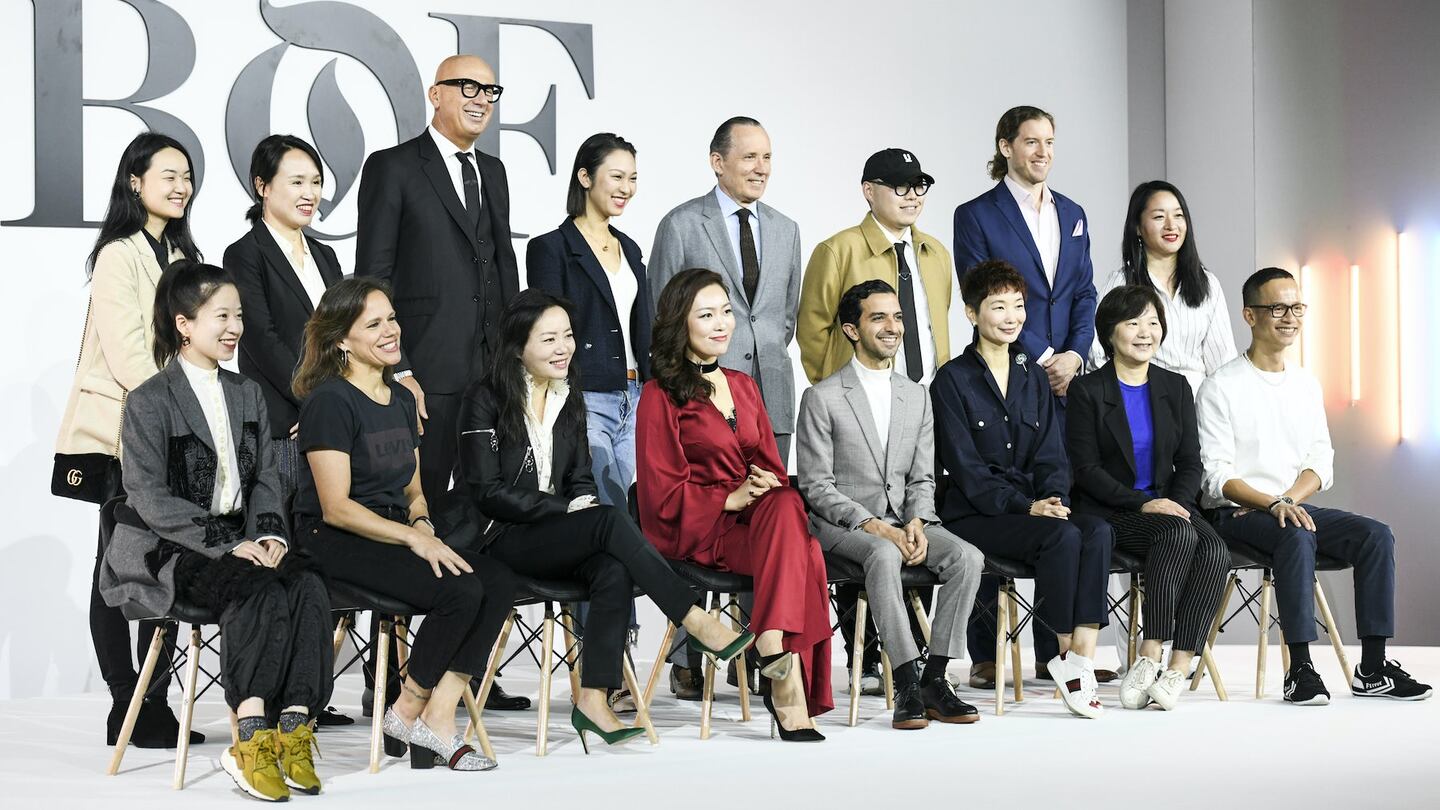
SHANGHAI, China — To say that China is making waves in the global fashion industry is one of the biggest understatements of our times. Success in this colossal market is a factor of being bold and daring, and incredibly shrewd. From its lightning fast e-commerce ecosystem and disruptive tech companies, to a mobile-first shopping culture and young consumers with unparalleled spending power, China's fashion market presents both enormous opportunities and significant challenges to industry leaders navigating what can sometimes feel like a labyrinth.
To gain insight into some the increasingly complex issues they face, The Business of Fashion founder and chief executive Imran Amed welcomed industry leaders to the second annual BoF China Summit on October 15 in Shanghai, in partnership with The Savannah College of Art and Design (SCAD).
The invitation-only event took place during Shanghai Fashion Week in the city’s newest shopping complex, HKRI Taikoo Hui, and featured 12 panel discussions with some of the most influential executives, entrepreneurs and thought leaders from China’s explosive fashion market.
“We are living in an era of constant change,” Amed said in his opening remarks. "The pace of innovation along the fashion value chain is accelerating faster than ever before, with a consumer that is more demanding and a market landscape that is more unpredictable.”
ADVERTISEMENT
Amed concluded: “As a result, it’s important for all of us to become more focused on the new frontiers of the fashion industry. Open dialogue and exchange are essential in order to navigate these changes — here in China, and beyond.”
One leader who has done just that is Gucci president and chief executive Marco Bizzarri, who has made several daring moves since appointing Alessandro Michele creative director of the Italian megabrand. Gucci's gains both in China and around the world were buoyed by their ability to transform the brand image and reinvigorate it with a sense of purpose.
These changes have instilled confidence: Gucci has seen its annual turnover grow more than 40 percent year-on-year, reaching €6.2 billionin 2017, and the brand attributes the Chinese market as a key driver of this success. Earlier this year, Bizzarri got the industry buzzing when he said he would now pursue a target of €10 billion.
When Amed asked how he would get to that lofty figure, Bizzarri responded in jest: “My famous crystal ball,” he deadpanned.
Risk to Reward Ratio
In China, Gucci’s business has doubled since 2015. Interestingly, the company has avoided following the lead of other luxury brands online in the market. Gucci is conspicuously absent from the list of brands that have opened a store on Alibaba Group’s e-commerce behemoth Tmall or its rival JD.com.
“Listen, it is very much sooner or later we're going to end up working with these platforms. [But] at the moment we are in a situation of wait and see. We are talking with these platforms,” Bizzarri said.
The Gucci chief executive's candour about having reservations about joining the huge Chinese platforms created an interesting dynamic since Jessica Liu, president of Tmall Fashion and Luxury for Alibaba Group, took to the stage shortly after Bizzarri.
ADVERTISEMENT
Liu addressed Bizzarri’s reservations head on, before going on the offensive to pitch to other brand executives at the event. “If today you joined the Tmall flagship store, we will have an analysis tool available for you the next day…We're not saying that luxury goods [companies] should consider working with us today just to see whether it is possible to increase their sales revenue by 10 percent,” she said. “Rather, it's about having a channel to reach 600 million users and possibly get to them earlier than your competition, even if it's by one quarter. It comes down to this: we hope to use big data to empower our partners [to get] opportunities to get insight into future trends and make changes more directly,” Liu added.
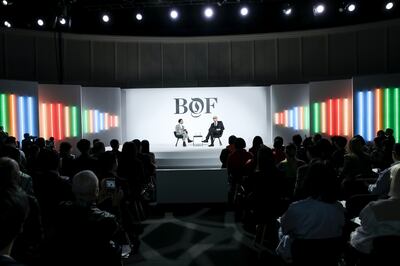
Imran Amed and Marco Bizzarri | Source: Lintao Zhang/Getty
Tmall has access to consumer data from nearly 400 cities. Many of those users are part of a giant ecosystem of Alibaba apps, including music, shopping, games and video, helping Tmall understand the overall lifestyles of their users.
The value of such consumer insights and behaviour on Chinese customers certainly isn’t lost on Bizzarri. “For sure everybody's keen to get all the data on the customers that these huge platforms have in China. On the other side, I think we need to make sure that we maintain this luxury feeling, luxury perception and this kind of exclusivity in terms of presentation and that is absolutely key for us.”
But the biggest risk associated with joining China’s big online platforms, he asserted, is still about counterfeiting. “Frankly speaking, [on] most of the platforms, there’s a lot of counterfeiting and I don’t want to certify counterfeiting because I belong to these platforms,” said Bizzarri.
“The point to me about the counterfeiting is not the counterfeit in itself. The counterfeiting feeds into a lot of things that are unethical. Why does [an item that's similar to one that we produce cost] $1 instead of $1,000 or $10 instead of $1,000? Because you don't [properly] pay the people, you use black [market] labour, you use children. [That's] something that I don't want to certify, and I don't want to support.”
Instead, Gucci is focusing its investment in other areas. Changing its store formats to reflect its new brand image has been especially effective in the Chinese market, Bizzarri said, boosting sales density by thirty to forty percent.
The Art of Reinvention
ADVERTISEMENT
Fostering the in-store experience is also critical for overseas Chinese shoppers. But Harrods managing director Michael Ward told BoF's Asia correspondent Casey Hall, that to capture this younger, more modern shopper, they are reinventing themselves across all of their touch points.
“We are reinventing the way we digitally communicate with our customers to tell them the stories to lure them to enter the store,” Ward said. “We’re [also] constantly changing the store. At the moment I have 150,000 square feet being refurbished because complacency to us is the worst evil.”
Yet the focus remains, to court Chinese consumers, who make up about one-fifth of the spending at the iconic Knightsbridge department store, on providing the “quintessential British experience.” Ward said that his Chinese customers are looking for those old-fashioned, traditional values when they shop with Harrods, so it’s key to “not be ashamed” of being a heritage-focused company while still being modern.
Indeed, even for a traditional, family-owned company like Ermenegildo Zegna Group, bold moves are necessary to appeal to the Chinese youth demographic. The group made a surprise announcement in August that it acquired American menswear label Thom Browne, "to invest in a brand for the next generation," said chief executive Ermenegildo Zegna. Already, the group has made major strides in China since first bringing over its suits in 1991, now showcasing fun and fashionable casualwear — think sneakers and caps — at the front of its in-store displays, coupled with a fully integrated digital strategy.
“The speed of change [in China], it’s unbelievable,” Zegna said. “Every time I come I learn something and I see something different… If you don’t watch who your competition is and how it moves, you are out of this market in a matter of two seasons.”
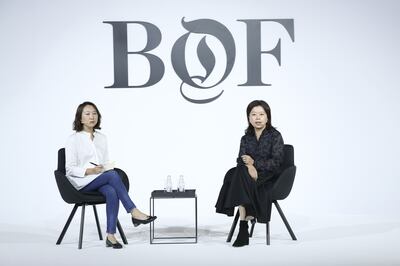
Zhao Jia, executive editor-in-chief of CBN Weekly and Jessica Liu | Source: Lintao Zhang/Getty
This is the argument that Tmall’s Jessica Liu makes for luxury brands harnessing big data on Tmall. The company claims it is working with 60 brand partners to better understand their customers’ ever-changing behaviour and around half have already adjusted their brand positioning accordingly.
“Today's consumer [in China] changes are very fast,” Liu cautioned. “For luxury brands, it may be enough for them to make plans for five years down the road, but now, if you don't revisit your consumer’s portrait every six months, maybe after two seasons things will go south for you.”
Liu said that while the proportion of consumers shopping for luxury online is still relatively low in China, their data reveals massive potential: about one-sixth of their 600 million shoppers are interested in luxury, and they predict that those who do buy high-end ready-to-wear online will soon be spending more.
Research this year between Tencent (parent company of WeChat) and The Boston Consulting Group reveals that the proportion of online search for luxury has — and will — continue to climb in the next five years. Fuelling that desire is the dissemination and digital application of emotional content, said Tencent Online Media Group director of consumer goods Shi Saifei.
High-quality content is driving our young consumers' new youth culture and their new needs.
China’s Big Spenders Revealed
“High-quality content is driving our young consumers’ new youth culture and their new needs,” Shi said, referencing the sale of lipsticks through a popular competition show about girl bands. “These young women are reflecting the dreams of the young consumers, and we can turn that into consumption.”
Mobile-first innovations like social commerce through WeChat mini programs and live-streaming can make this path to purchase shorter and “consistent with the consumption habits and pace of the younger generation.”
Meanwhile, Tezign, a China-based supplier of data intelligence solutions that’s backed by Sequoia Capital and Hearst Ventures, is using algorithms to test content on different platforms during major shopping discount festivals like Singles Day. Its co-founder and chief marketing officer Daisy Guo said artificial intelligence can save companies money and “improve efficiency and productivity,” by limiting the amount of mistakes that occur in the production process at the factory.
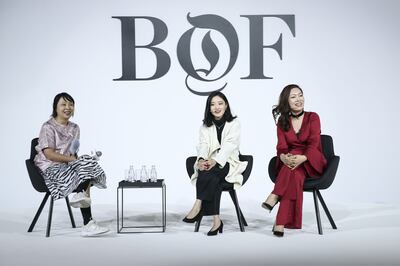
Shaway Yeh, Daisy Guo and Liu Mengyuan | Source: Lintao Zhang/Getty
Big data is also playing a big role in other new frontiers for China, including sustainability. “Chinese companies have an advantage because we have the largest textile industry,” said Tana Dai, executive general manager of Erdos Fashion Group, which produces more than one-third of the world’s cashmere and sells product in 1,000 stores across China.
"We use big data from Tmall to guide our inventory," Dai told sustainable fashion pioneer and media veteran Shaway Yeh. "We need to be able to respond and adapt our supply chain quickly based on big data analysis."
Tech innovator Liu Mengyuan, chief executive and founder of fashion rental app Ycloset, has been contributing to the sustainability movement through her hope to change the way women buy clothes. With 15 million registered users and Alibaba as a major investor, Ycloset seeks to “provide a new lifestyle” for its customers, harnessing predictive technologies to help women find their style in maintaining their “cloud closet,” but also so that her company can make better and more efficient predictions as to the lifetime value of a piece of clothing.
Even if many of them are not yet renting apparel, about 60 percent of middle class Chinese consumers say they care about where their products are made and whether brands have sustainable values, according to chief marketing officer of Global Brands at Levi Strauss & Co., Jennifer Sey.
Sey had these consumers' interests in mind when she recently brought Chinese style blogger and influencer Anny Fan of Style on Top to experience their new laser technology at a pop-up jeans customisation studio in downtown Los Angeles. Shoppers can create their own finishes on a pair of jeans in a matter of seconds after mapping out their design on an iPad, which the company claims could drastically reduce their chemical and environmental footprint.
Harnessing celebrity power
Fan’s social influence makes the case for another hot topic for brands looking to crack China: do celebrities still have leverage for brands in an online world bursting with key opinion leaders (KOLs)? And how does a brand determine, in an increasingly noisy social media environment, whether an influencer collaboration will drive the results the brand needs?
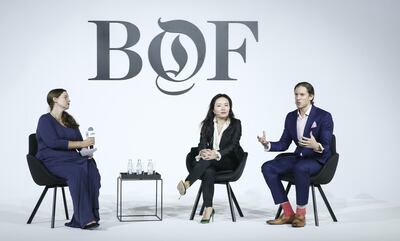
Casey Hall, Joyce Weng, and Lyndon Morant | Source: Lintao Zhang/Getty
Bulgari Greater China’s brand communications director Joyce Weng and L’Atelier Asia Pacific Chief Strategy Officer Lyndon Morant weighed in on these questions. “KOLs really provide the second tier of storytelling to reinforce why a product is made the way it is, production wise, design wise and so on,” Weng explained.
Bulgari has taken on celebrity brand ambassadors, Kris Wu (to target the aspirational, young generation) and Shu Qi (for its more traditional shoppers). Morant maintains they provide unique value to the brand, but said celebrities generally don't have authority when it comes to, for example, assessing a product's quality. "Chinese consumers are smart — they're inundated with a lot of content and they're able to do their own research down to the nth degree," he said. "So authenticity is the key reason in why you choose to work with KOLs."
As international fashion brands still learn how to navigate the Chinese market, China's domestic designer and creative community is coming of age on the global stage. Elle China chief executive and editor in chief Xiao Xue demonstrated this simply by showcasing magazine covers over the past three decades. Over the years, ever since Elle China featured the first Chinese model, actress Zhang Ziyi, on the cover in 2000, photographer Leslie Zhang and makeup artist Yooyo Keong Ming have carved out their own style and modern interpretation of the Chinese aesthetic.
Investing wisely
There's arguably no better way to witness this transformation of Chinese visual and cultural identity than through Shanghai Fashion Week, now in its 15th year. What started out as on one platform with approximately 48 designers and an audience of a couple hundred people has exploded into an event with hundreds of brands and more than 10,000 professional spectators, including buyers from some of the biggest international retailers. "It's been undergoing unbelievably fast development," said Shanghai Fashion Week vice secretary general Lv Xiaolei.

Imran Amed and Wendy Yu | Source: Lintao Zhang/Getty
Rather than separating out men’s and women’s apparel, Shanghai Fashion Week organisers have made space for platforms and showrooms with diverse positioning strategies. Arguably the most prominent being is a tie-up with Labelhood, dedicated to helping young and emerging designers find a global audience.
Yu Holdings founder & chief executive Wendy Yu, a millennial herself, is also passionate about giving a voice to a new generation of Chinese consumers, leveraging her investing power to help independent designers like Mary Katrantzou to reach the Chinese market. "Our company is still in its early stages and we are constantly fine-tuning our direction, but we hope to add value to the global fashion industry, not only through financial means, but by increasing the number of brands we invest in," she told Amed in the final session that revealed a joint prize.
The Business of Fashion will play a major role in cultivating Chinese talent in ready to wear with the launch of the BoF China Prize in partnership with Yu Holdings. After five finalists are selected to showcase their looks at Shanghai Fashion Week, judges will pick one winner who will be awarded $100,000 and the chance to present their collection as part of London Fashion Week in September 2019.
“We believe BoF can play a critical role in helping the global fashion community understand and engage the Chinese fashion community, acting as a bridge between the two,” Amed said.
The Savannah College of Art and Design (SCAD) is a Partner of the BoF China Summit
Shanghai Fashion Week is the Strategic Partner of the BoF China Summit
HKRI Taikoo Hui is the Venue Partner of the BoF China Summit
Yu Holdings is the Principal Partner of the BoF China Prize

Ermenegildo Zegna, Imran Amed, and Marco Bizzarri | Source: Lintao Zhang/Getty
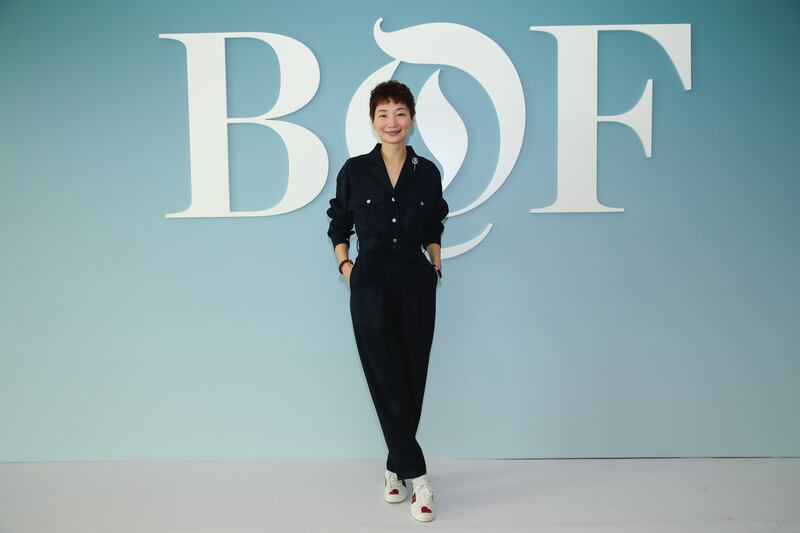
Xiao Xue | Source: Lintao Zhang/Getty
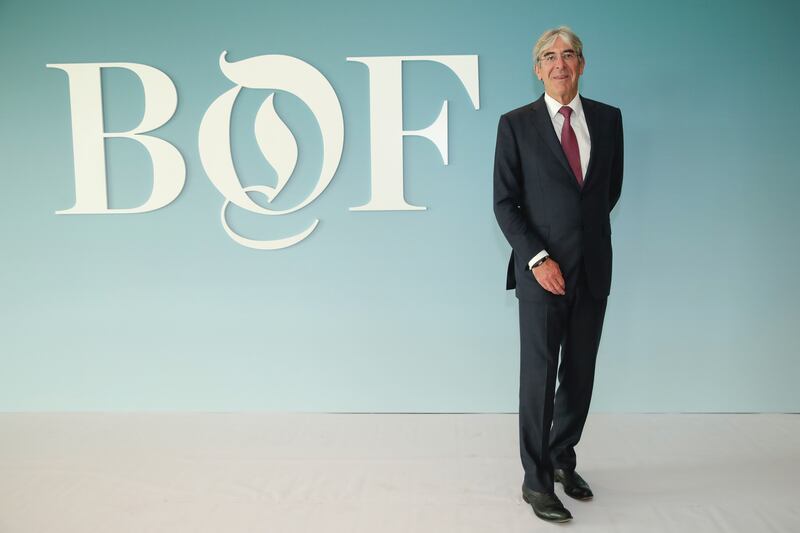
Michael Ward | Source: Lintao Zhang/Getty
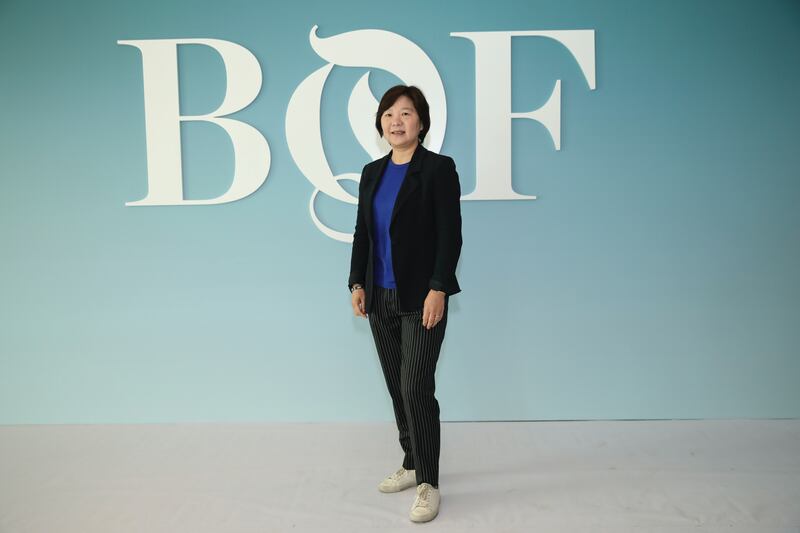
Lv Xiaolei | Source: Lintao Zhang/Getty
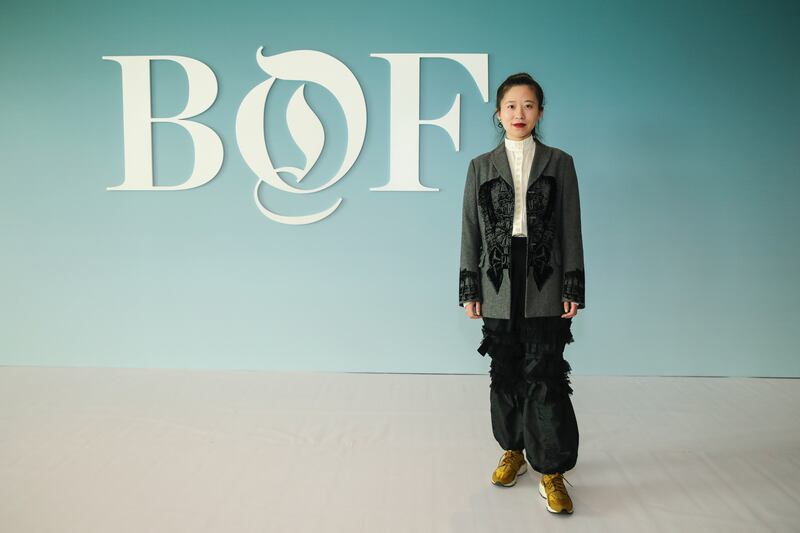
Tasha Liu, founder of Labelhood | Source: Lintao Zhang/Getty

Anny Fan, Yooyo Keong Ming and guests | Source: Lintao Zhang/Getty
With consumers tightening their belts in China, the battle between global fast fashion brands and local high street giants has intensified.
Investors are bracing for a steep slowdown in luxury sales when luxury companies report their first quarter results, reflecting lacklustre Chinese demand.
The French beauty giant’s two latest deals are part of a wider M&A push by global players to capture a larger slice of the China market, targeting buzzy high-end brands that offer products with distinctive Chinese elements.
Post-Covid spend by US tourists in Europe has surged past 2019 levels. Chinese travellers, by contrast, have largely favoured domestic and regional destinations like Hong Kong, Singapore and Japan.